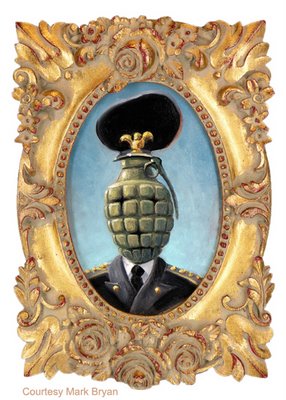
A Mega-Frame is like ornate framing that surrounds a picture or painting. It encloses and defines information. Amateur and professional artists deeply appreciate the value of framing: the right frames will enhance their pictures - the wrong frames will devalue them. Many an artist has created works that have not become truly expressive or beautiful until they have been enclosed in the right frame.
Framing has a long and rich history. The Sophists of ancient Greece were masterful framers and re-framers. Aristotle coined the word “atechnoi” to describe it. One of ancient Rome’s greatest orators, Cicero, elevated frames (“statis”) to an art form. His speeches are still studied by students of influence and rhetoric.
Mega-framing describes Strategic or psychological framing and underpins the art of managing perception. It takes in the ‘big picture’ rather than detail. It may be an overarching theme that enjoins or describes the detail in your presentation, or it may link all your points to a lesson, a purpose or a moral.
Mega-frames are powerful because they allow you to enclose your message within a framework of higher intentions, virtues or a big-picture concept generally understood or held to be true by most people. This is termed frame alignment, and it refers to the linkage of a message to a set of common interests, values or beliefs, so as to position a speaker and audience as one.
In selecting a mega-frame, your aim can be to link your total presentation to one major idea, high principle or key value.
Every society is rooted in deep sets or clusters of ideals. In western society, for example, we ‘believe’ in democracy. From that belief comes a raft of ‘virtues’, represented by abstracts such as Freedom of Speech, the Right to Choose, Respect for Individual Rights, Freedom of Movement, Equity in Society (in some quarters), and so on.
The key is to establish a legitimate association between your idea/message/proposal/action and a universal virtue or value. Examine the following words and see if you can detect a “virtue” in them. Put them into a sentence, internalise them and notice the emotional responses they bring about.
• goodness • health • love • peace
• choice • dream • happiness • fairness
• liberty • vision • truth • justice
• rights • honesty • opportunity • ethics
• safeguard • success • strength • prosperity
• freedom • righteousness • self-control • family
• safety • purity • empowerment • compassion
• protection • relief • scientific • respect
The above words represent values embraced by most people in western worlld. They are anchors for the aspirations of our communities and few individuals would venture to challenge them. Each person will have his or her own personal interpretation of what they mean, however, in all but a few cases, the feelings people associate with the words will be positive ones.
Virtue mega-frames educe unconscious acceptance of the content in which they are wrapped. They add immense power to your presentation because most people embrace them as self-evident truths. Review the following opening sentences and notice how a strong virtue frame helps the speaker evoke powerful emotional responses to support her case:
“This is not an issue about governments resuming private land to subdivide and on-sell. This is an issue about freedom. Freedom from the greedy intentions of bureaucrats who want to fund their grandiose projects by robbing you of your birthright; freedom to live your life on a piece of rural Australia without fear that the land of your labour can be snatched from you; freedom from the whims of fat-cats who live hundreds of miles away, never having experienced life in a close rural community.
I know that, as small landowners, you value freedom above all else. Why else would have you chosen to build your life here, free from all the contaminations of big-city life? Now is the time to fight for the justice of your cause; to fight for your freedom; to send an unequivocal message to those who would destroy your community forever.
And know that your calls will be heard by many decent-minded country Australians. They will help you in your fight, because they know that you must never, never, never, give in to bully boys from the big city, who, like common thieves, would take your freedom from you. They know that the price of giving in would be their freedom too.”
In everyday life, you assess information unconsciously through the filters of your values, beliefs, decisions and attitudes. Emotions, or feelings, erupt from the filtering process and drive action. It’s a natural process and enclosing your message in a Virtue Mega-Frame taps into that process. It allows you to filter your message through the core values, beliefs and embraced virtues of your audience.
(c) 2006 Desmond Guilfoyle
No comments:
Post a Comment